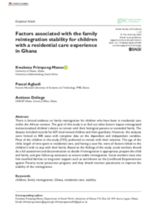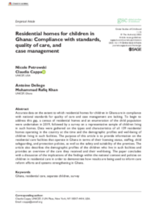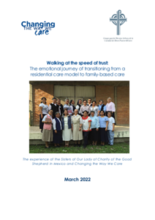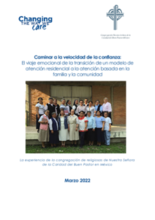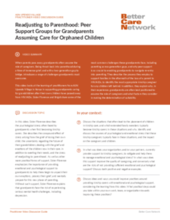Displaying 101 - 110 of 1510
This study looked at how well matched children in England are to their homes and the extent to which their participation, views, wishes and feelings are considered in the decision-making process. The study looked at a small group of children who have a very wide and diverse set of needs and who live in children’s homes that were visited by Ofsted inspectors in late 2019.
This study aimed to use longitudinal data pertaining to children who had been adopted from care to examine the relationship between being adopted from care and psychological trauma.
There is limited evidence on family reintegration for children who have been in residential care within the African context. The goal of this study is to find out what factors impact reintegrated institutionalized children’s desire to remain with their biological parents or extended family.
The purpose of this article is to provide information on the residential care facilities that operate in Ghana in terms of their licensing status, staffing, child safeguarding, and protection policies, as well as the safety and suitability of the premises. The article also describes the demographic profiles of the children who live in such facilities and provides an overview of the care they received and their well-being.
This webinar was hosted by the Transitioning Residential Care Working Group of the Transforming Children’s Care Global Collaborative Platform and showcased learning around the transition of residential care services.
This brief documents the first stages of a learning process between Changing the Way We CareSM and the Mexican Province of the Congregation of the Sisters of Our Lady of Charity of the Good Shepherd as the Sisters moved forward in their transition process. It is written for practitioners and organizations, including Catholic actors interested in supporting or engaging in a transition process with women religious and also provides useful information for those engaging in transition with non-faith actors.
Este informe documenta las primeras etapas de un proceso de aprendizaje entre Cambiando la forma en que Cuidamos y la Congregación de las Hermanas de Nuestra Señora de la Caridad del Buen Pastor en México a medida que ellas avanzan en su proceso de transición. Este documento está dirigido a los profesionales, las organizaciones y los actores católicos interesados en apoyar o participar en un proceso de transición con las organizaciones católicas y también proporciona información útil para aquellos que participan en la transición con actores no religiosos. Esto incluye un importante aprendizaje relacionado con la forma de acompañar a las religiosas en el proceso de transición, comprendiendo los matices relacionados con el tiempo, el contenido y el enfoque. Y lo más importante es que explora el componente emocional que conlleva el hecho de que las religiosas, adapten el enfoque de su carisma a medida que se transforman, pasando de proporcionar atención residencial a una atención basada en la familia y la comunidad.
The study was aimed at gaining insights into the operations of privately run, Christian faith-based residential care facilities (RCFs) in Myanmar. The outcomes of this analysis provide important insights to inform ongoing awareness raising, advocacy efforts, approaches to providing technical support and deinstitutionalization, and care reform strategies in Myanmar.
यस अध्ययनले सातवटा केन्द्रित देशहरूमा २१ अर्ध-संरचित अन्तर्वार्ताहरू समावेश गरी गुणस्तरीय अनुसन्धान अध्ययन सञ्चालन गरेर निजी रूपमा सञ्चालित र वित्त पोषित आवासीय हेरचाह संस्थाहरूको सानो संख्यामा COVID-19 को प्रभावको अन्वेषण गर्दछ।
This video summary accompanies the Readjusting to Parenthood: Peer Support Groups for Grandparents Assuming Care for Orphaned Children (Upendo Village, Kenya) practitioner learning video which is part of the Kenya Practitioner Learning Video Series.



